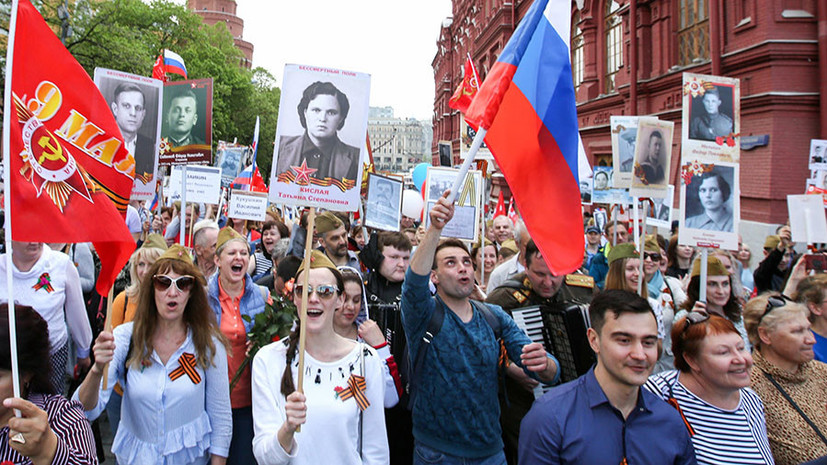Just as “Crimea is Ours” paled with time as a mobilizing tool, so too Vladimir Putin’s “Great Victory” by itself will be insufficient for him to dominate Russia in the future, Serhii Ilchenko says; and so the Kremlin leader is adding another quiver to his bow, declaring Russia a separate civilization based on hostility to the rest of the world and its representatives inside Russia.
And new surveys show, despite what many had hoped, the Ukrainian commentator says, that the rising generation in Russia is quite prepared to follow that lead, one that resembles Nazism and presages a Russia more oppressive at home and more aggressive abroad.
Ilchenko reaches that conclusion on the basis of an analysis that begins with the observation that
“This isn’t news,” the Ukrainian analyst continues. “That Russia is not subject to reformation and from the old Muscovite elite can arise only a new evil, has been known from the very beginning.” But “the details of the new Russian project have emerged only recently and are taking ever clearer shape” before our eyes.
According to Ilchenko, “the old Yeltsin-Putin skin of the Russian reptile is bursting and in a year or two we will see a renewed Russia” once again. What can be seen of its emerging characteristics are anything but encouraging.
He argues that what is occurring now is a struggle between the siloviki out of which Putin sprung and the multi-national corporations that he has profited from. The former are all about control and building a fortress Russia; the latter are about making money regardless of borders.
The former have enormous power domestically and the latter are weak relative to other international corporate players. Indeed, they sometimes have to make concessions to these groups not out of a commitment to any rules of the game but rather because the others are stronger than they are.
But because the multinationals have made Putin and his team so rich, they have been able to force the siloviki to give way on occasion. The pandemic has accelerated that process. Ilchenko says. That is because it has demonstrated that the siloviki lack the resources “to maintain full control over Russia.”
The more thoughtful of the siloviki are reluctantly willing to do this. They see that Putin’s sharing of power with the regional governments is in fact sharing power with the multinational corporations most of whom have strong positions in particular regions and thus are able to use them to promote their interests.
But the multinationals, although globalist in one sense, are not any more committed to “the democratization of Russian social life” than are the siloviki. On the contrary, they may be willing to be even more authoritarian in order to maintain the position of the one percent over the 99.
This combination of factors has forced Putin to look for a new legitimating principle for his rule and one that allows him to keep his base in the siloviki without costing him the wealth of the multinationals. He might have preferred to rely on Russian Orthodoxy, but the national church is too weak and thus has no chance of becoming the Leninism of the Putin era.
Young Russian are buying into this with its image of greatness and sacrifice even though few really want to fall under NATO tanks.
In sum, Ilchenko says, Putin appears to have found a winning combination but not one that points to a more democratic and more cooperative Russia. “’The Great Victory’ even in combination with ‘the struggle with fascism’ hasn’t been able to fill the entire ideological niche,” the analyst argues.
He needed something additional, and has found it with the idea of Russia as a separate and distinct civilization up against the rest of the world which is hostile to it. Moreover, he has found a group to promote this for him, Zakhar Prilepin’s For Truth Party, and thus manage the ideological aspect of the leadership transition.
“There is no doubt that the Prilepin party in 2021 will overcome the electoral barrier and have seats in the Duma.”
That is because “national socialism” of the kind Putin is outlining now “ideally combines ‘Orthodox obsession with Victory’” and thus in Russia has more than a few supporters, the Ukrainian commentator says.
Read More:
- What if? Hybrid War and consequences for Europe (part 1)
- Russia to drastically expand its influence over Ukraine, rest of post-Soviet space
- In the shadow of revised history: Kremlin’s war on remembrance continues
- Ukraine is a major battleground for understanding WWII: historian Serhiy Plokhy
- The political dimension of Russia’s spy war in Ukraine
- Moscow worried about Ankara’s plans for canal bypassing Bosporus Strait
- Moscow continues hybrid war against Ukraine despite pandemic, Danilyuk says
- Kremlin employs Cossacks, Moscow Patriarchate in Ukraine against Kyiv
- Hybrid War in Ukraine – predictions for 2019 and beyond
- Leaked Kremlin emails show Minsk protocol designed as path to Ukraine’s capitulation – Euromaidan Press report
- What Surkov’s hacked emails tell about Russia’s hybrid war against Ukraine
- The basis for a peaceful resolution of the war in eastern Ukraine – trends at the end of 2019
- The Surkov Leaks: Major report on Russia’s hybrid war in Ukraine published at RUSI Institute




